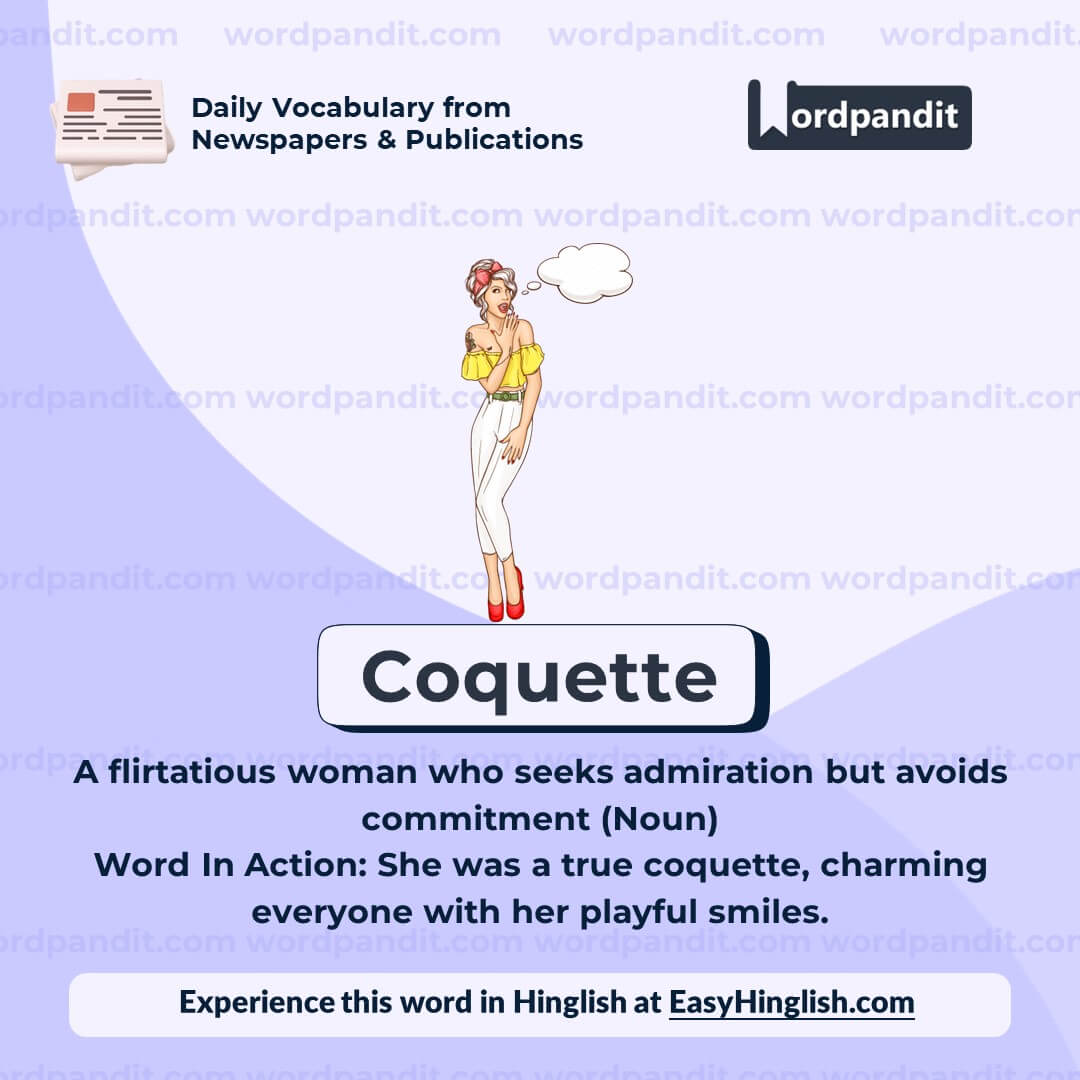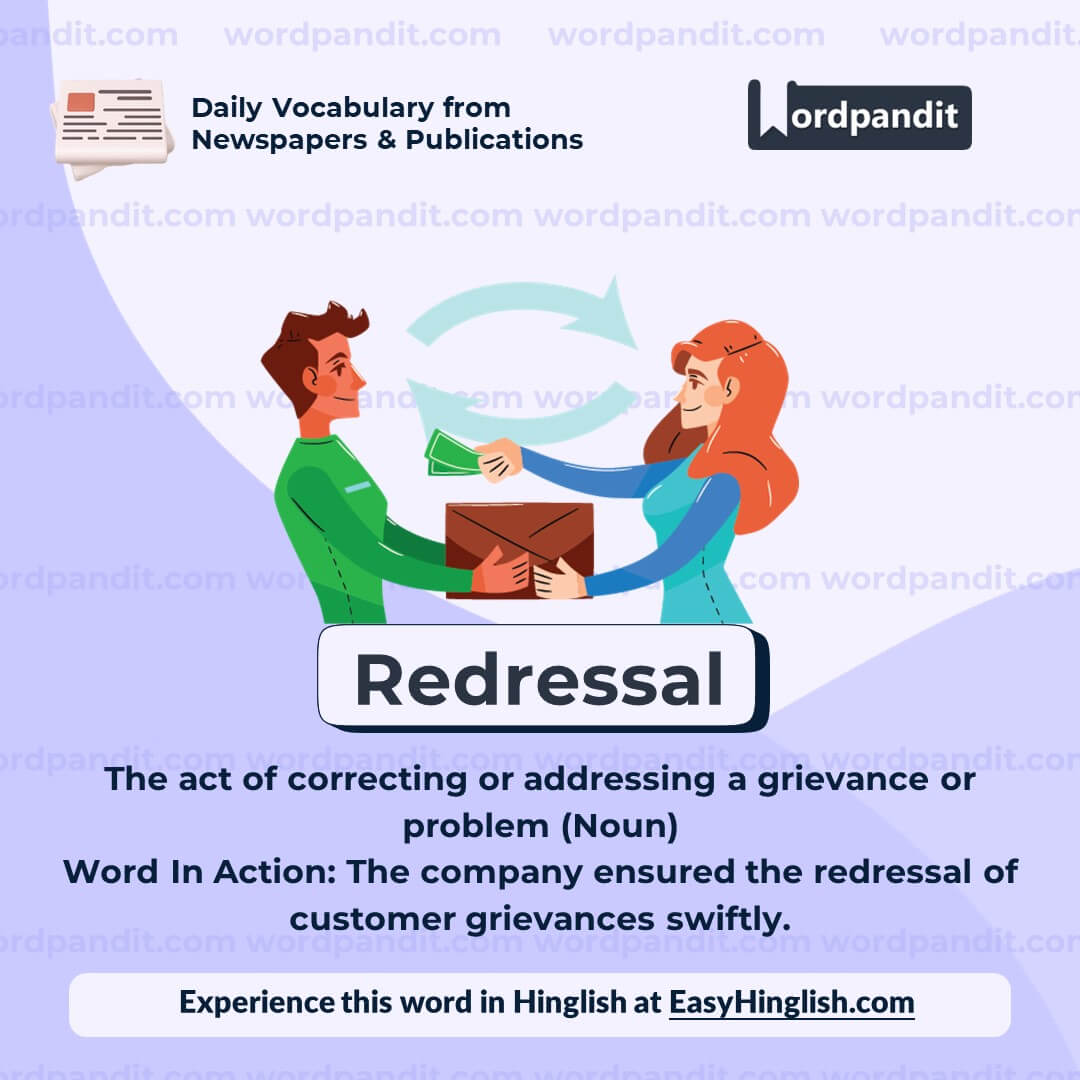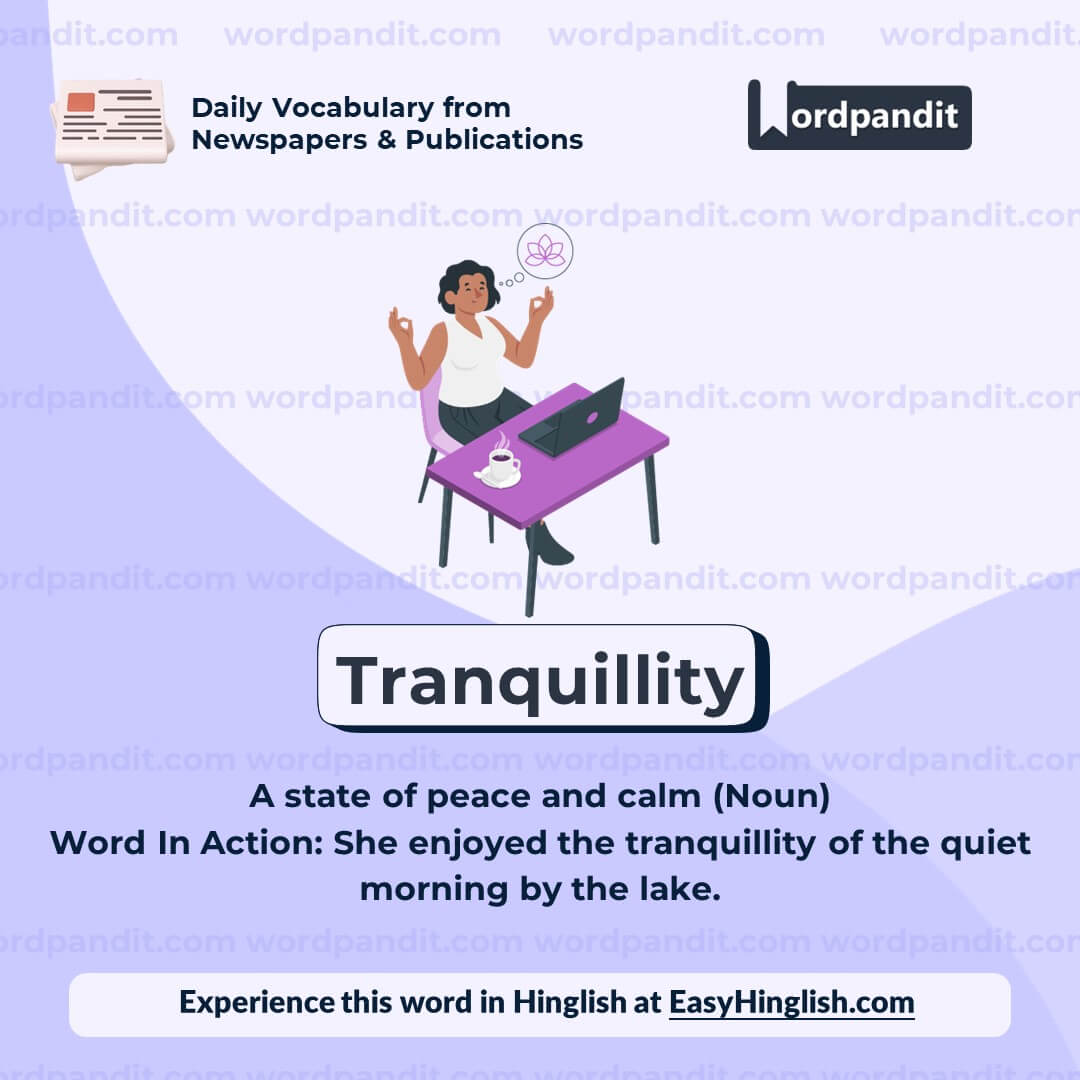Daily Vocabulary from Indian Newspapers and Publications
Welcome to Wordpandit’s Indian Vocabulary Hub
At Wordpandit, we understand the importance of staying rooted in the local context while expanding your language skills. This section focuses on enriching your vocabulary with words and phrases drawn from India’s leading newspapers and publications, ensuring you're learning vocabulary that is practical, relevant, and uniquely Indian.
Why Indian Sources Matter
We believe that the best way to master any language is by immersing yourself in local content. That’s why we carefully curate vocabulary from top Indian publications, including:
- The Hindu
- The Times of India
- The Economic Times
- Hindustan Times
- Live Mint
- The Indian Express
- And many others...
Stay Updated, Stay Relevant
With daily updates from Indian news sources, you’ll be consistently learning words that reflect the trends and shifts in Indian society and culture. Our focus is to provide vocabulary that enhances your understanding of the language in an Indian context.
How Wordpandit Supports Your Goals
Whether you’re preparing for exams, aiming to improve your professional communication, or simply want to stay connected with the latest Indian vocabulary, Wordpandit is here to guide you every step of the way.
Learn with a Practical Approach
Our interactive learning methodology includes real-world examples, engaging activities, and context-specific usage to ensure that every word becomes part of your active vocabulary.
Dive into Indian Vocabulary Today!
Why Choose Wordpandit?
Practical Learning: Focus on words you'll actually encounter in real-world reading, enhancing your comprehension and communication skills.
Diverse Content: From current affairs to scientific breakthroughs, our varied sources expose you to vocabulary across multiple domains.
Effortless Integration: Make Wordpandit a part of your daily routine. Just a few minutes each day can significantly boost your lexicon over time.
Your Path to Vocabulary Mastery
- Visit our Daily Vocabulary section regularly
- Explore new words and their usage in context
- Practice incorporating these words into your own writing and speech
- Track your progress as your vocabulary expands
Start Your Journey Today
Embark on your vocabulary enhancement journey with Wordpandit. By consistently engaging with our daily posts, you'll build a robust vocabulary that serves you well in academic, professional, and personal contexts.
Remember, a word a day keeps linguistic limitations at bay. Make Wordpandit your daily companion in the quest for vocabulary excellence!
WORD-1: Coquette
Context:
"In literature, a coquette is often a female character who uses wit, beauty, and flirtation to navigate society." - The Hindu
Explanatory Paragraph:
A "coquette" is a person, typically a woman, who flirts playfully to gain attention or admiration. This term is often used to describe characters in literature who use charm and wit to influence others. The word carries connotations of lighthearted teasing rather than deep romantic interest.
Meaning: A flirtatious woman who seeks admiration but avoids commitment (Noun)
Pronunciation: koh-KET
Difficulty Level: ⭐⭐⭐ Intermediate
Etymology: Derived from French "coquette," the feminine form of "coquet," meaning a flirtatious man. "Coq" means "rooster," symbolizing vanity and preening behavior.
Synonyms & Antonyms:
Synonyms: Flirt, tease, siren, vamp, seductress
Antonyms: Prude, introvert, reserved person
Usage Examples:
- Her coquettish smile and playful remarks made her the center of attention at every gathering.
- In 19th-century literature, the coquette was often portrayed as a woman who wielded power through charm rather than status.
- He saw through her coquetry, realizing that her flirtations were merely a game.
- Despite her coquettish behavior, she never truly intended to lead anyone on.
Cultural Reference:
"Scarlett O’Hara, the protagonist of *Gone with the Wind*, embodies the spirit of a coquette—using her beauty and charm to manipulate those around her." - Literary Analysis
Think About It:
Is being a coquette always a negative trait, or can it be seen as a form of empowerment in certain contexts?
Quick Activity:
Write a short dialogue between two characters where one is acting coquettishly to get what they want.
Memory Tip:
Think of "coquette" as a "cocky flirt"—a person who flirts confidently but doesn’t commit.
Real-World Application:
The term "coquette" is often used in fashion, literature, and social commentary to describe individuals who use charm and flirtation as a social tool.
WORD-2: Behest
Context:
"As a former government lawyer noted, 'that assuming a legal heir was handed over cash after confirming and due verification to establish heir-deceased relationship, the government will always have the record, given that it is being done through government offices and officials, and not at the behest of any individual or specific political party.'" - The Hindu
Explanatory Paragraph:
The word "behest" refers to an authoritative command, request, or directive given by someone in power or authority. It implies that an action is carried out as per someone's explicit orders. The term is often used in legal, governmental, or formal contexts where decisions are made based on official directives rather than personal discretion.
Meaning: An authoritative order or urgent request (Noun)
Pronunciation: bih-HEST
Difficulty Level: ⭐⭐⭐ Intermediate
Etymology: Derived from Middle English "behest," meaning "a command or promise," from Old English "behǣs," which means "a vow or injunction."
Synonyms & Antonyms:
Synonyms: Order, command, decree, directive, instruction
Antonyms: Suggestion, request, proposal, plea
Usage Examples:
- The policy was changed at the behest of the Prime Minister.
- At his mother’s behest, he returned home to take care of family matters.
- The soldiers were deployed at the behest of the defense ministry.
- The new law was introduced at the behest of environmental activists demanding stricter pollution controls.
Cultural Reference:
"In Shakespeare’s *Macbeth*, many of the protagonist's actions occur at the behest of Lady Macbeth, who urges him to commit regicide." - Literary Analysis
Think About It:
Can acting at someone’s behest always be justified, or should individuals take responsibility for their own decisions?
Quick Activity:
Write a short paragraph about a historical event where an important decision was made at the behest of a leader.
Memory Tip:
Think of "behest" as "be his test"—a command is given, and someone must follow it, like a test of obedience.
Real-World Application:
The term "behest" is often used in political and legal discussions to emphasize that actions are taken under authority rather than personal choice.
WORD-3: Redressal
Context:
"For ex-gratia payment to the next of kin of those who died during the Covid-19 pandemic, the Delhi government in January 2022, had issued detailed guidelines, listing the eligibility criteria, as well as grievance redressal committees for each of the 11 revenue districts." - Indian Express
Explanatory Paragraph:
"Redressal" refers to the process of resolving or addressing complaints, grievances, or injustices. It is commonly used in legal, governmental, and organizational contexts where mechanisms are established to provide remedies for wrongdoings or unfair treatment. The term implies an official process aimed at ensuring justice or fairness.
Meaning: The act of correcting or addressing a grievance or problem (Noun)
Pronunciation: ri-DRES-uhl
Difficulty Level: ⭐⭐⭐ Intermediate
Etymology: Derived from the word "redress," which comes from Old French "redrecier," meaning "to set right" or "to correct."
Synonyms & Antonyms:
Synonyms: Remedy, correction, resolution, reparation, restitution
Antonyms: Neglect, ignorance, indifference, injustice
Usage Examples:
- The company set up a grievance redressal system to address employee complaints efficiently.
- Citizens demanded a redressal of their concerns regarding poor road conditions in the city.
- The court ordered financial redressal for the victims of the fraud scheme.
- A new consumer redressal forum has been established to handle complaints about defective products.
Cultural Reference:
"India’s Consumer Protection Act provides a legal framework for consumer grievance redressal through consumer courts at various levels." - Legal Studies
Think About It:
How can an effective grievance redressal mechanism contribute to a fair and just society?
Quick Activity:
Find and write about a real-world case where a grievance redressal mechanism helped resolve an issue.
Memory Tip:
Think of "redressal" as "re-dress"—fixing a problem is like dressing a wound again to heal it properly.
Real-World Application:
Redressal mechanisms are essential in government and corporate sectors to handle grievances, ensuring fairness in policies and decisions.
WORD-4: Polarised
Context:
"Jaishankar then emphasised that both countries had played a key role in upholding the G-20. 'We should also recognise that in a polarised global situation, our two countries have worked hard to preserve and protect the G20 as an institution.'" - The Wire
Explanatory Paragraph:
The term "polarised" refers to a situation where people, opinions, or groups are divided into two sharply contrasting or opposing sides, often with little middle ground. This can occur in politics, society, or even scientific debates, leading to conflict and division. A polarised situation is typically marked by strong differences in opinion and an unwillingness to compromise.
Meaning: Divided into two opposing or contrasting groups (Adjective)
Pronunciation: POH-luh-ryzd
Difficulty Level: ⭐⭐⭐ Intermediate
Etymology: Derived from "polarise," which comes from the Latin "polaris," meaning "of or relating to the pole." It originally referred to the physical concept of polarity before being applied to social and ideological divisions.
Synonyms & Antonyms:
Synonyms: Divided, fragmented, split, extreme, opposed
Antonyms: United, neutral, balanced, harmonious, impartial
Usage Examples:
- The country has become increasingly polarised due to conflicting political ideologies.
- The debate on climate change remains polarised, with strong opinions on both sides.
- Social media platforms often contribute to the polarisation of public opinion.
- The government tried to introduce reforms to bridge the gap in an increasingly polarised society.
Cultural Reference:
"The Cold War era was a time of extreme political polarisation, with the world divided into capitalist and communist blocs." - History Textbooks
Think About It:
Can a polarised society ever find common ground, or is division inevitable in human nature?
Quick Activity:
Think of a current issue that has caused polarisation in your country. Write a short paragraph explaining both sides of the argument.
Memory Tip:
Think of a magnet—when something is "polarised," it has two opposing ends that repel each other.
Real-World Application:
The term "polarised" is frequently used in media and politics to describe extreme divisions in public opinion, such as in elections, social issues, and international relations.
WORD-5: Tranquillity
Context:
"Ministry of External Affairs (MEA) spokesperson Randhir Jaiswal said that two ministers, in their meeting lasting half an hour, 'reviewed developments in our bilateral relationship since their last meeting in November, specifically the management of peace and tranquillity in border areas.'" - The Wire
Explanatory Paragraph:
"Tranquillity" refers to a state of peace, calmness, and serenity, free from disturbances, conflict, or stress. It is often used to describe environments, emotions, or relationships that are stable and harmonious. The word is commonly associated with nature, meditation, and diplomatic affairs where maintaining peace is crucial.
Meaning: A state of peace and calm (Noun)
Pronunciation: trang-KWIL-ih-tee
Difficulty Level: ⭐⭐⭐ Intermediate
Etymology: Derived from the Latin "tranquillitas," meaning "calmness" or "quiet," from "tranquillus," meaning "still" or "peaceful."
Synonyms & Antonyms:
Synonyms: Peace, calmness, serenity, stillness, harmony
Antonyms: Chaos, disturbance, turmoil, unrest, agitation
Usage Examples:
- After a hectic day, she sought tranquillity in the quiet of her garden.
- The lake's tranquillity was only disturbed by the occasional ripple of a fish jumping.
- The peace agreement aimed to restore tranquillity in the war-torn region.
- Yoga and meditation promote mental tranquillity and emotional balance.
Cultural Reference:
"The phrase 'peace and tranquillity' is commonly used in legal and diplomatic contexts, as seen in historical treaties such as the 'Treaty of Paris' that ended wars and restored peace." - History Textbooks
Think About It:
In today's fast-paced world, how can individuals cultivate tranquillity in their daily lives?
Quick Activity:
Write a short paragraph describing a place where you feel the most tranquillity. What makes it peaceful?
Memory Tip:
Think of "tranquil" as "quiet and still"—both words evoke a sense of peace.
Real-World Application:
The concept of tranquillity is important in mental health, international relations, and personal well-being. Many people seek tranquillity through meditation, travel, or spending time in nature.

















